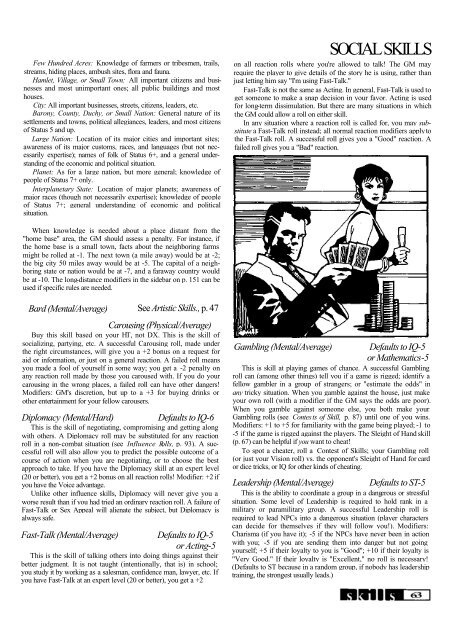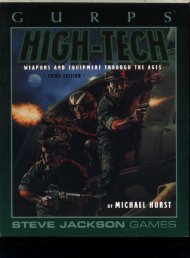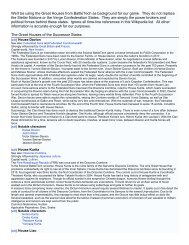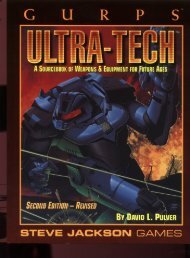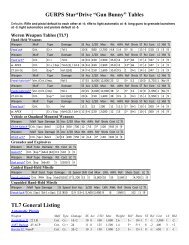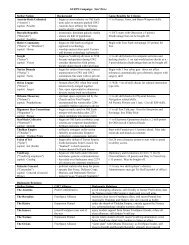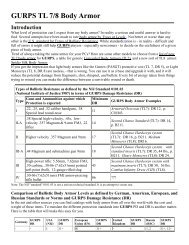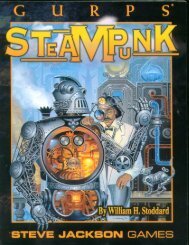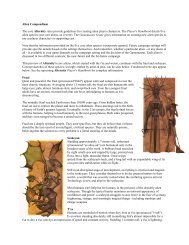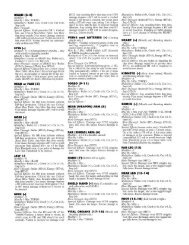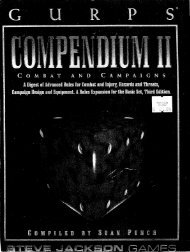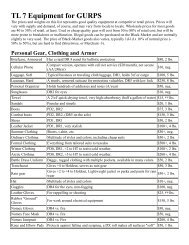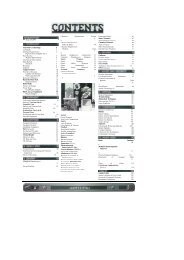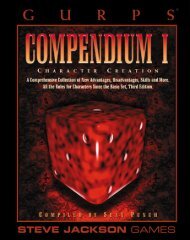Few Hundred Acres: Knowledge of farmers or tribesmen, trails,streams, hiding places, ambush sites, flora and fauna.Hamlet, Village, or Small Town: All important citizens and businessesand most unimportant ones; all public buildings and mosthouses.City: All important businesses, streets, citizens, leaders, etc.Barony, County, Duchy, or Small Nation: General nature of itssettlements and towns, political allegiances, leaders, and most citizensof Status 5 and up.Large Nation: Location of its major cities and important sites;awareness of its major customs, races, and languages (but not necessarilyexpertise); names of folk of Status 6+, and a general understandingof the economic and political situation.Planet: As for a large nation, but more general; knowledge ofpeople of Status 7+ only.Interplanetary State: Location of major planets; awareness ofmajor races (though not necessarily expertise); knowledge of peopleof Status 7+; general understanding of economic and politicalsituation.SOCIAL SKILLSon all reaction rolls where you're allowed to talk! The GM mayrequire the player to give details of the story he is using, rather thanjust letting him say "I'm using Fast-Talk."Fast-Talk is not the same as Acting. In general, Fast-Talk is used toget someone to make a snap decision in your favor. Acting is usedfor long-term dissimulation. But there are many situations in whichthe GM could allow a roll on either skill.In any situation where a reaction roll is called for, you may substitutea Fast-Talk roll instead; all normal reaction modifiers apply tothe Fast-Talk roll. A successful roll gives you a "Good" reaction. Afailed roll gives you a "Bad" reaction.When knowledge is needed about a place distant from the"home base" area, the GM should assess a penalty. For instance, ifthe home base is a small town, facts about the neighboring farmsmight be rolled at -1. The next town (a mile away) would be at -2;the big city 50 miles away would be at -5. The capital of a neighboringstate or nation would be at -7, and a faraway country wouldbe at -10. The long-distance modifiers in the sidebar on p. 151 can beused if specific rules are needed.Bard (Mental/Average)See Artistic Skills., p. 47Carousing (Physical/Average)Buy this skill based on your HT, not DX. This is the skill ofsocializing, partying, etc. A successful Carousing roll, made underthe right circumstances, will give you a +2 bonus on a request foraid or information, or just on a general reaction. A failed roll meansyou made a fool of yourself in some way; you get a -2 penalty onany reaction roll made by those you caroused with. If you do yourcarousing in the wrong places, a failed roll can have other dangers!Modifiers: GM's discretion, but up to a +3 for buying drinks orother entertainment for your fellow carousers.Diplomacy (Mental/Hard)Defaults to IQ-6This is the skill of negotiating, compromising and getting alongwith others. A Diplomacy roll may be substituted for any reactionroll in a non-combat situation (see Influence Rolls, p. 93). A successfulroll will also allow you to predict the possible outcome of acourse of action when you are negotiating, or to choose the bestapproach to take. If you have the Diplomacy skill at an expert level(20 or better), you get a +2 bonus on all reaction rolls! Modifier: +2 ifyou have the Voice advantage.Unlike other influence skills, Diplomacy will never give you aworse result than if you had tried an ordinary reaction roll. A failure ofFast-Talk or Sex Appeal will alienate the subject, but Diplomacy isalways safe.Fast-Talk (Mental/Average) Defaults to IQ-5or Acting-5This is the skill of talking others into doing things against theirbetter judgment. It is not taught (intentionally, that is) in school;you study it by working as a salesman, confidence man, lawyer, etc. Ifyou have Fast-Talk at an expert level (20 or better), you get a +2Defaults to HT-4Gambling (Mental/Average) Defaults to IQ-5or Mathematics-5This is skill at playing games of chance. A successful Gamblingroll can (among other things) tell you if a game is rigged; identify afellow gambler in a group of strangers; or "estimate the odds" inany tricky situation. When you gamble against the house, just makeyour own roll (with a modifier if the GM says the odds are poor).When you gamble against someone else, you both make yourGambling rolls (see Contes ts of Skill, p. 87) until one of you wins.Modifiers: +1 to +5 for familiarity with the game being played; -1 to-5 if the game is rigged against the players. The Sleight of Hand skill(p. 67) can be helpful if you want to cheat!To spot a cheater, roll a Contest of Skills; your Gambling roll(or just your Vision roll) vs. the opponent's Sleight of Hand for cardor dice tricks, or IQ for other kinds of cheating.Leadership (Mental/Average)Defaults to ST-5This is the ability to coordinate a group in a dangerous or stressfulsituation. Some level of Leadership is required to hold rank in amilitary or paramilitary group. A successful Leadership roll isrequired to lead NPCs into a dangerous situation (player characterscan decide for themselves if they will follow you!). Modifiers:Charisma (if you have it); -5 if the NPCs have never been in actionwith you; -5 if you are sending them into danger but not goingyourself; +5 if their loyalty to you is "Good"; +10 if their loyalty is"Very Good." If their loyalty is "Excellent," no roll is necessary!(Defaults to ST because in a random group, if nobody has leadershiptraining, the strongest usually leads.)
SOCIAL SKILLSMerchant (Mental/Average)Defaults to IQ-5This is the ability to act as a "trader," buying and selling merchandise.It involves salesmanship, understanding of trade practices,and psychology. On a successful skill roll, a Merchant can(among other things): judge the value, in his own culture, of anypiece of common goods; find out where any commodity is boughtand sold; find the local fair market value of any commodity; etc.Modifiers: If the commodity is illegal, the Merchant is at a -3penalty unless he has Streetwise at 12+ or specializes in thosegoods.A merchant in an unfamiliar area will have a penalty (-2 to -6,GM's decision) until he has had time to become familiar with thecustoms and prices there.A merchant can choose to specialize (see p. 43) in some singleclass of goods. In this case, he has a +5 when dealing with this class ofgoods, but a -1 with other goods.When two merchants are haggling, the GM may settle it quicklyby a Contest of Skills between the two. The winner adds or subtracts10% of fair value, depending on whether he was trying to sell orbuy.A character who has this ability at any level gets a +1 on reactionrolls when buying or selling. A character who has this skill atexpert level - 20 or better - gets a +2.Performance (Mental/Average) Defaults to IQ-5,Acting-2 or Bard-2This is the ability to act on the stage or screen. It is differentfrom Acting in that you are trying to impress and entertain people,but not necessarily to fool them. If this skill is studied, it alsoincludes the professional knowledge of the type of acting appropriatefor the period (stage directions, actor/agent/producer relations, typesof cameras, etc.).Politics (Mental/Average)Defaults to IQ-5or Diplomacy-5This is the ability to get into office, and to get along with otherpoliticians. It has nothing to do with administration! This skill canonly be learned in office or by working for someone in office. Asuccessful Politics roll will give you +2 on any reaction from afellow politician. When running for office, roll a Contest ofPolitics Skills. Modifier: +2 if you have the Voice advantage. Insome jurisdictions, money is another important reactionmodifier . . .Public SpeakingSee Bard, p. 47Savoir-Faire (Mental/Easy)Defaults to IQ-4This is the skill of "good manners" - whatever they may be inthis particular culture. A successful Savoir-Faire roll is required toget along in "high society" without embarrassing yourself - rollonce for each party or meeting. A successful roll can also detectsomeone who is pretending to high rank or good breeding.In any "high society" situation where a reaction roll is called for,you may substitute a Savoir-Faire roll instead; all normal reactionmodifiers apply to the Savoir-Faire roll. A successful roll gives you a"Good" reaction. A failed roll gives you a "Bad" reaction.Modifiers: +2 if you have higher rank or "class" than the NPC youare trying to impress; -2 if your social status is lower; +2 if youseem to have important friends!; -2 or more if the culture is verydifferent from your own (-6 would be appropriate for an alien culture).It can also be difficult to pass yourself off as a wildly differentsocial class than yours. The prince would have a hard a time portrayinga pauper and vice versa. In general, a Savoir-Faire roll isrequired to impersonate anybody more than 3 social levels awayfrom your own. If your "native" social level is negative and you aretrying to pass yourself off as someone from level 1 or better, or viceversa, a Savoir-Faire roll is required at -2.Sex Appeal (Mental/Average)Defaults to HT-3Based on HT, not IQ. This is the ability to impress the oppositesex. It can only be studied in your "free time" - say, a maximum ofthree hours a day - unless you are a member of a harem or theequivalent. The Sex Appeal ability has as much to do with yourattitude as it does with your looks. If you are not willing to "vamp"someone to get what you want, you won't have this talent or want it.Modifier: +2 if you have the Voice advantage. Double all normaldisadvantages for appearance!In any encounter with the opposite sex, if a reaction roll is calledfor, you may substitute a Sex Appeal roll instead; all normal reactionmodifiers apply to the Sex Appeal roll. See Influence Rolls, p. 93. Asuccessful roll gives you a "Very Good" reaction. A failed roll givesyou a "Bad" or worse reaction. Usually, only one attempt is allowedper "victim," though the GM might allow you another attempt after afew weeks.Strategy (Mental/Hard) Defaults to IQ-6, Tactics-6or other Strategy type-4This is the ability to plan military actions and to predict theactions of the enemy. It is usually taught only by the military. Asuccessful Strategy roll will let you deduce, in advance, enemy militaryplans unless they are led by another person with this skill. Inthat case, the GM rolls a Contest of Skills between the two strategists;if the player-character loses, he guesses wrong (i.e., is givenfalse information) about the enemy plans. The amount of informationthe strategist gets depends on how good his roll was, but not howgood the foe's plans are. A howling mob uses strategy - they justdon't know it themselves, and they are easy to out-think.A strategist must specialize (p. 43) in a type of strategy: importanttypes are land, naval and space. The specific units being commandedare less important; at worst, a strategist might have a -1 or -2 whenplanning for units of another nation or TL, as long as he hasaccurate information about their capabilities.Tactics (Mental/Hard) Defaults to IQ-6 or Strategy-6This is the ability to outguess the enemy when the fight is manto-manor in small groups. It is usually taught only by the military. Asuccessful Tactics roll during a battle will sometimes (GM's discretion)allow you information about immediate enemy plans. Ifyou have studied this skill at all, you get a +1 bonus on initiativerolls. If you have Tactics at an expert level (20 or above), you get a+2 bonus on initiative rolls.Teaching (Mental/Average)Defaults to IQ-5This is the ability to instruct others. In order to teach someone,you must know the skill being taught at a higher level than yourstudent knows it. Anyone with a Teaching skill of 12 or bettershould be allowed to act as a teacher for most game purposes. A rollshould only be required if it is vital to the "plot" of the adventure thatsome difficult point be taught to someone. If a language barrierexists, the GM should also roll to see if the teacher and student arecommunicating properly!
- Page 3 and 4:
17. FLIGHT.........................
- Page 5 and 6:
Materials Needed for PlayThe GURPS
- Page 7 and 8:
WHAT IS ROLEPLAYING?A roleplaying g
- Page 9 and 10:
Character TypesThere are no "charac
- Page 12 and 13: Four numbers called "attributes" ar
- Page 14 and 15: You are free to set the physical ap
- Page 16 and 17: REPUTATIONSome characters are so we
- Page 18 and 19: These are character traits that are
- Page 20 and 21: Legal Enforcement Powers 5, 10 or 1
- Page 22 and 23: Rapid Healing5 pointsThis advantage
- Page 24 and 25: A minor deity as Patron to a travel
- Page 26 and 27: ReputationVariable (see p. 17)Socia
- Page 28 and 29: Lame-15,-25, or -35 pointsYou have
- Page 30 and 31: Bad Temper-10 pointsYou are not in
- Page 32 and 33: Dyslexia-5 or -15 pointsYou have a
- Page 34 and 35: Pacifism-15 or -30 pointsYou are op
- Page 36 and 37: Shyness-5,-10,-15 pointsYou are unc
- Page 38 and 39: You have a significant responsibili
- Page 40 and 41: A "quirk" is a minor personality tr
- Page 42 and 43: SpecializingRequired Specialization
- Page 44 and 45: MEANING OF SKILL LEVELSSo you have
- Page 46 and 47: Teamster (Mental/Average)Defaults t
- Page 48 and 49: Skiing (Physical/Hard)Defaults to D
- Page 50 and 51: Guns/TL (Physical/Easy)Defaults to
- Page 52 and 53: Any of these skills can be self-tau
- Page 54 and 55: Levels of Language SkillThis table
- Page 56 and 57: Most outdoor skills can be learned
- Page 58 and 59: PSIONIC SKILLSThese are special men
- Page 60 and 61: Forensics/TL (Mental/Hard)Defaults
- Page 64 and 65: Many skills in this category are ta
- Page 66 and 67: Lockpicking/TL (Mental/Average) Def
- Page 68 and 69: Gunner/TL See Combat Skills, p. 50M
- Page 70 and 71: Now you need to decide what equipme
- Page 72 and 73: Each suit of "real" armor includes
- Page 74 and 75: Listing Weapons On Your Character S
- Page 76 and 77: Recording Encumbrance on YourCharac
- Page 78 and 79: Passive Defense. The first blank is
- Page 80 and 81: The longer (and the more skillfully
- Page 82 and 83: When you improve a skill, the cost
- Page 84 and 85: Not all the advantages and disadvan
- Page 86 and 87: But remember . . . some skills have
- Page 88 and 89: ClimbingTo climb anything more diff
- Page 90 and 91: SwimmingThe Swimming skill (p. 49)
- Page 92 and 93: WILL ROLLSWhen a character is faced
- Page 94 and 95: The GURPS combat system is designed
- Page 96 and 97: WaitDo nothing unless a foe comes w
- Page 98 and 99: You may only block one attack per t
- Page 100 and 101: Missile WeaponsMissile weapons are
- Page 102 and 103: At the end of your move, if you hav
- Page 104 and 105: The rules for attacking a foe are e
- Page 106 and 107: tell you how long it will take. In
- Page 108 and 109: You may normally parry only one att
- Page 110 and 111: CLOSE COMBATUsing the Move, Step an
- Page 112 and 113:
(adjusted) ST! Note that a shield h
- Page 114 and 115:
Ranged Weapon StatsFor each ranged
- Page 116 and 117:
second. On the table, this rounds u
- Page 118 and 119:
If you are using the "hit location"
- Page 120 and 121:
Removing or folding the stock of a
- Page 122 and 123:
After the initial "freeze" ends, ea
- Page 124 and 125:
ATTACKING INANIMATE OBJECTSThere ar
- Page 126 and 127:
This subtraction will mostoften aff
- Page 128 and 129:
Psionic healing (p. 175) and magica
- Page 130 and 131:
DrowningSee the rules for Swimming,
- Page 132 and 133:
protects completely. Toughness prot
- Page 134 and 135:
Resolving mounted or vehicular comb
- Page 136 and 137:
Using Ranged Weapons From Horseback
- Page 138 and 139:
This section covers special rules f
- Page 140 and 141:
HT: Health and Hit PointsFor a roug
- Page 142 and 143:
Swarm AttacksA group of small creat
- Page 144 and 145:
Encumbrance and MovementEncumbrance
- Page 146 and 147:
A critical miss means the energy co
- Page 148 and 149:
oll will not end the spell, but the
- Page 150 and 151:
If the subject makes the resistance
- Page 152 and 153:
won't work. If anyone but the caste
- Page 154 and 155:
ANIMAL SPELLSThese are the spells r
- Page 156 and 157:
If the summoning spell is repeated,
- Page 158 and 159:
Cost: 1 for an object up to the siz
- Page 160 and 161:
Armor EnchantmentsThese spells work
- Page 162 and 163:
AuraInformationShows the caster a g
- Page 164 and 165:
Psionics, or "psi" abilities, are p
- Page 167 and 168:
GlossaryESP - Extra-Sensory Percept
- Page 169 and 170:
Psionics and MagicMagic and psionic
- Page 171 and 172:
PSYCHOKINESISThis power covers movi
- Page 173 and 174:
Pside EffectsPsi skills can have "s
- Page 175 and 176:
Limitations(Continued)Fickle: varia
- Page 177 and 178:
Player-Made MapsWhenever the player
- Page 179 and 180:
Predetermined ReactionsCertain NPCs
- Page 181 and 182:
Dealing with the PlayersArgumentsAs
- Page 183 and 184:
Time Use SheetsThe Time Use Sheet (
- Page 185 and 186:
Weapons and Armor0. Fists and stone
- Page 187 and 188:
Weather(Continued)WindWinds from ga
- Page 189 and 190:
Gold and SilverA traditional assump
- Page 191 and 192:
JobsThe jobs available in each game
- Page 193 and 194:
Job (Prerequisites), Monthly Income
- Page 195 and 196:
Sooner or later, every GM wants to
- Page 197 and 198:
Features of a GoodAdventureA good a
- Page 199 and 200:
World-BuildingA game world is a com
- Page 201 and 202:
CRITICAL HIT TABLEAll doublings or
- Page 203 and 204:
When the players meet an NPC whose
- Page 205 and 206:
Weapons are listed in groups, accor
- Page 207 and 208:
MODERN AND ULTRA-TECH WEAPONSWeapon
- Page 209 and 210:
ANCIENT/MEDIEVAL ARMORUse this tabl
- Page 211 and 212:
FANTASY/MEDIEVAL EQUIPMENTThe follo
- Page 231 and 232:
After eight printings of the GURPS
- Page 233 and 234:
of Divination should match the "fla
- Page 235 and 236:
Minor disadvantage: -5 points. Agai
- Page 237 and 238:
Whether through an accident of birt
- Page 239 and 240:
Note that this disadvantage is inco
- Page 241 and 242:
SKILLSARTISTIC SKILLSVideo Producti
- Page 243 and 244:
traders, and chess-like games are c
- Page 245 and 246:
If, during an adventure, a philosop
- Page 247 and 248:
VITAL ORGANSThese are optional rule
- Page 256 and 257:
INSTANT CHARACTERSThis quick refere


